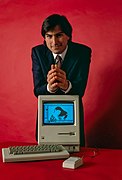
Back بوابة:إنترنت Arabic دەروازە:ئینتەرنێت CKB Portál:Internet Czech Portal:Internet German Portal:Internet Spanish درگاه:اینترنت Persian Portail:Internet French פורטל:אינטרנט HE Պորտալ:Համացանց Armenian Portal:Internet ID
The Internet PortalThe Internet (or internet) is the global system of interconnected computer networks that uses the Internet protocol suite (TCP/IP) to communicate between networks and devices. It is a network of networks that consists of private, public, academic, business, and government networks of local to global scope, linked by a broad array of electronic, wireless, and optical networking technologies. The Internet carries a vast range of information resources and services, such as the interlinked hypertext documents and applications of the World Wide Web (WWW), electronic mail, telephony, and file sharing. The origins of the Internet date back to research that enabled the time-sharing of computer resources and the development of packet switching in the 1960s. The set of rules (communication protocols) to enable internetworking on the Internet arose from research and development commissioned in the 1970s by the Defense Advanced Research Projects Agency (DARPA) of the United States Department of Defense in collaboration with universities and researchers across the United States and in the United Kingdom and France. The ARPANET initially served as a backbone for the interconnection of regional academic and military networks in the United States to enable resource sharing. The funding of the National Science Foundation Network as a new backbone in the 1980s, as well as private funding for other commercial extensions, encouraged worldwide participation in the development of new networking technologies and the merger of many networks using DARPA's Internet protocol suite. The linking of commercial networks and enterprises by the early 1990s, as well as the advent of the World Wide Web, marked the beginning of the transition to the modern Internet, and generated sustained exponential growth as generations of institutional, personal, and mobile computers were connected to the network. Although the Internet was widely used by academia in the 1980s, the subsequent commercialization in the 1990s and beyond incorporated its services and technologies into virtually every aspect of modern life. (Full article...) Selected article
Wikipedia is a multilingual, open content, free encyclopedia project operated by the non-profit Wikimedia Foundation. Its name is a portmanteau of the words wiki (a type of collaborative website) and encyclopedia. Launched in 2001, it is the largest, fastest growing and most popular general reference work currently available on the Internet. As of December 2007, Wikipedia had approximately 9 ¼ million articles in 253 languages, comprising a combined total of over 1.41 billion words for all Wikipedias. The English Wikipedia edition passed the 2,000,000 article mark on September 9, 2007. Wikipedia's articles have been written collaboratively by volunteers around the world and the vast majority of them can be edited by anyone with access to the Internet. Critics have questioned Wikipedia's reliability and accuracy, citing its open nature. The criticism is centered on its susceptibility to vandalism, such as the insertion of profanities or random letters into articles, and the addition of spurious or unverified information; uneven quality, systemic bias and inconsistencies; and for favoring consensus over credentials in its editorial process. Scholarly work suggests that vandalism is generally short-lived. When Time Magazine recognized "You" as their Person of the Year 2006, Wikipedia was the first particular "Web 2.0" service mentioned, followed by YouTube and MySpace.
Selected picture The iPhone is a multimedia, Internet-enabled mobile phone designed and marketed by Apple Inc. It has a multi-touch screen with virtual keyboard and buttons. The iPhone was introduced, first in the United States on June 29, 2007 with much media frenzy and then in the United Kingdom, Germany and France in November 2007. It was named Time magazine's Invention of the Year in 2007. News
Wikinews Internet portal
WikiProjects
Did you know (auto-generated) -
Selected biography
Albert Arnold "Al" Gore, Jr. (born March 31, 1948) was the forty-fifth Vice President of the United States, serving from 1993 to 2001 under President Bill Clinton. Gore previously served in the U. S. House of Representatives (1977–85) and the U. S. Senate (1985–93), representing Tennessee. He was the Democratic Party presidential nominee in the 2000 election, and shared the 2007 Nobel Peace Prize with the Intergovernmental Panel on Climate Change for his work as an environmental activist. Gore has been involved with the development of the Internet since the 1970s, first as a Congressman and later as Senator and Vice-President. His High Performance Computing and Communication Act of 1991 (often referred to as the Gore Bill) was passed on December 9, 1991 and led to the National Information Infrastructure (NII) which Gore referred to as the "information superhighway." Leonard Kleinrock, a key player in the development of the ARPANET, considers the act to be a critical moment in Internet history. Internet pioneers Vint Cerf and Bob Kahn stated in the 2000 article "Al Gore and the Internet", that Gore was "the first political leader to recognize the importance of the Internet and to promote and support its development."
General images -The following are images from various internet-related articles on Wikipedia.
Selected quoteMore Did you know...
Main topics
Featured contentCategoriesRelated portalsThings you can do
Associated WikimediaThe following Wikimedia Foundation sister projects provide more on this subject:
Wikipedia's portals |
© MMXXIII Rich X Search. We shall prevail. All rights reserved. Rich X Search





















































